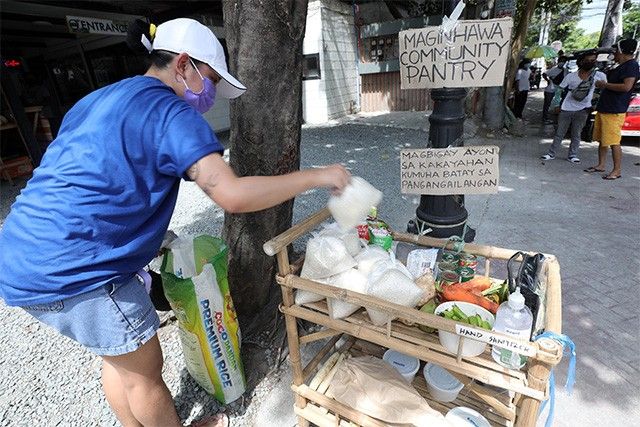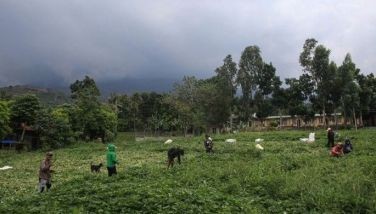LGUs urged: Don't restrict community initiatives over 'violations'

MANILA, Philippines — As the coronavirus pandemic rages on, local chief executives on Tuesday were urged to take on more active roles in supporting the community pantries and privately-led initiatives that continue to pop up all over the country amid the coronavirus-induced community quarantines.
At the "COVID-19 Pandemic and Community Initiatives to Fight Hunger" online forum hosted by Now You Know PH on Tuesday afternoon, organizers of community pantries and kitchens called on government officials to support community-led initiatives to address persistent hunger during the community quarantine.
After first expressing support for the initiatives and saying no permits were required, local governments like Quezon City later required pantry organizers to notify the city government at least five days in advance.
"Even if they are not actively assisting, if only they didn't clamp down on pantries anymore when they see what they call violations over social distancing. Instead of making the community pantries close, they should go inside and bring order to the violations themselves," law professor Charlie Yu, who set up a community pantry in New Manila, said in mixed Filipino and English.
"There is really no reason to stop the pantries...the reasons they have are valid [but] we should not look at it in the perspective of regulatory permitting. The question should be, people are in need, so how can we help?"
With Filipinos still waiting on government aid, community pantries popped up all over the country to assist the hungry and the jobless. The principle was simple and widely adopted: Take what you need, give what you can.
From the very beginning, pantry organizers have reported harassment, red-tagging, and profiling at the hands of uniformed police personnel. The Philippine National Police's leadership continues to deny these ever happened.
"The least they could do is to help if they cannot do anything else...they should be glad that we are doing this for the people," Frieda Hizon, a Makati community pantry volunteer said.
"The only thing they do for us is set up our tables for our pantry...they are the ones who tell the crowd to do social distancing so we are not anymore responsible for it."
READ: How community-led projects kept the urban poor afloat amid COVID-19
Involve local communities themselves, organizers say
In May, a survey conducted by the science department’s Food and Nutrition Research Institute indicated that 62.1 percent of Filipino households have experienced moderate or severe food insecurity.
Climb Against Cancer founder Nini Sacro suggested that more than just overseeing the privately-led projects, local governments can also put up their own community initiatives and find ways to adapt the existing idea.
"I think they're able to do good things. [Outside of that] the only help we get from the government is I guess they help with coordination, but other than that, it's just us," the community kitchen organizer said in Filipino.
Gelyn Rosillo, a civil society leader at the Save San Roque alliance said that including local communities in initiatives geared at assisting them made all the difference.
"In the beginning, we weren't able to prepare for the sudden lockdown. We had a hard time looking for our next meal," she said in Filipino of the urban poor community of Sitio San Roque.
"It's so important to include the community because this is where unity and solidarity begins."
According to Rosillo, the group put up community kitchens "where the masses themselves were taking action." Today, they are able to feed some 5,000 mouths a day through their 27 kusinang bayan chapters, she said.
Despite threats from police, the alliance also put up community gardens out of demolished homes. Members of the community themselves tilled the soil and tended to the okra, papaya, and cabbage crops for sustenance.
"We really have to acknowledge that we're outsiders in the community. We don't want to be messianic, so in every project that we do, we want it to be a partnership," Coleen Raro of social enterprise Be A Giver said.
"The communities know more about their state and what's best for their community. As an enterprise, we're really just here to support them."
READ: Urban poor community turns demolished homes into food security gardens
- Latest
- Trending






























